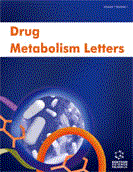Abstract
Background: Nebivolol is a drug available as a racemate of d-nebivolol (SRRR) and lnebivolol (RSSS). In human liver microsomes, CYP2D6 mainly catalyses the metabolism of lnebivolol, while CYP2C19 catalyses the metabolism of d-nebivolol. Nebivolol stereoselective pharmacokinetics has been described only for extensive metabolizers (EM).
Objective: To describe the stereoseletive nebivolol pharmacokinetics in CYP2D6 poor metabolizers (PM) and to assess whether the phenotype has an impact on nebivolol pharmacokinetics.
Methods: Three healthy volunteers PM phenotyped (ratios of 20.1, 220 and 244 for the 8 h urinary excretion of metoprolol/alfa-hydroxymetoprolol) received a single oral dose of racemic nebivolol and sequential blood samples were collected between zero (predose) and 48 h.
Results: The obtained data were compared to 22 EM subjects with normal kidney function enrolled in our previous study. For both isomers, Cmax, Tmax and AUC0-48 were significantly greater in the PM group compared to the EMs (p = 0.006 – 0.001). For d-nebivolol, Cmax, Tmax and AUC0-48 were, on average, 5.9, 2.7 and 15.0 larger in PMs. The corresponding values for l-nebivolol were 4.4, 2.7 and 17.5.
Conclusion: The decline in plasma concentration of both nebivolol isomers in PM phenotypes, especially those with MR of 220 and 244, which indicate minimal or absent CYP2D6 activity, points to alternative mechanisms for nebivolol elimination. Collectively, our results are the first to show the significant impact of CYP2D6 PM phenotype on the metabolic disposition and in vivo exposure to both nebivolol isomers.
Keywords: Pharmacokinetics, isomers, nebivolol, phenotype, CYP2D6, healthy volunteers.
Graphical Abstract
 34
34 3
3 1
1










